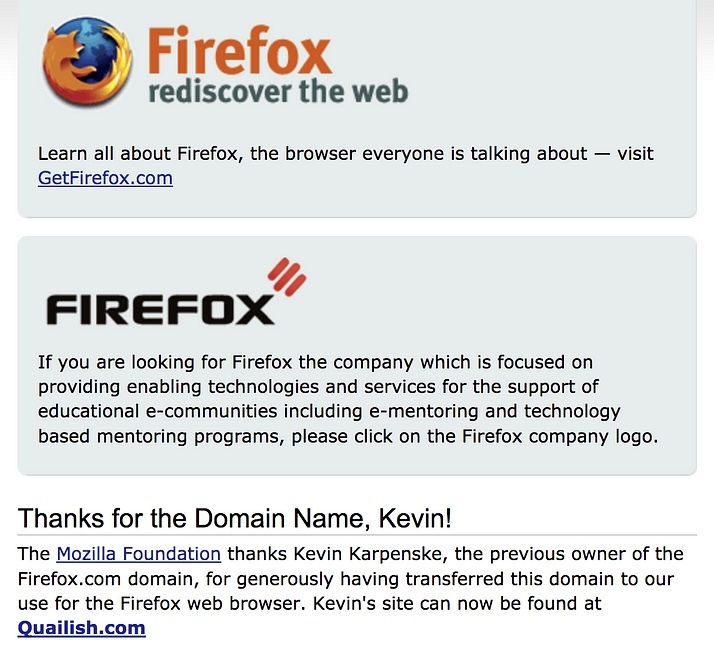- cross-posted to:
- [email protected]
- cross-posted to:
- [email protected]
Reminder to switch browsers if you haven’t already!
- Google Chrome is starting to phase out older, more capable ad blocking extensions in favor of the more limited Manifest V3 system.
- The Manifest V3 system has been criticized by groups like the Electronic Frontier Foundation for restricting the capabilities of web extensions.
- Google has made concessions to Manifest V3, but limitations on content filtering remain a source of skepticism and concern.
Long live Firefox.
hear ye
Pretty great outcome for firefox really.
I don’t think firefox numbers will get a huge & immediate bump, but I think that over time it will support a reputation for firefox as being cool different and just plain better.
I can’t imagine raw-dogging the internet without an ad blocker in 2024. I’m aware that most people aren’t bothered by ads, but surely… surely some people might be interested in blocking them if they become aware that it’s possible and easy.


After bingeing that show, I have a constant fear that he’s been standing behind me the whole time, just waiting for me to catch a glimpse of him.
Been here since Kevin helped the project out?

I’m sorry. I’ve seen this so many times today and I can’t stand it anymore.
I hate this article photo. What the fuck is that shit?? Gloveless fingers? Digit warmer? Turtlefinger sweater?
Finger sweatbands for epic googling activities
The 80s are back! Sweatbands for everyone!
Agreed, but also
How can you not kinda love it
i’m with you it’s really camp
Firefox is a good option.
But I will raise people one more. Waterfox. Been using it for over a year now and enjoy it.
Firefox’s marketshare is small enough relative to Chrome’s that some websites might just block it at this point, if Chrome users mean ad revenue and Firefox users don’t.
https://gs.statcounter.com/browser-market-share
Firefox has 2.88% marketshare.
Chrome has 65.34% marketshare.
It’s gonna be interesting to see what happens…
It doesn’t necessary cost a meaningful amount to a site to allow Firefox users to view it; it does however cost to make it compatible with non-chromium browsers. For most viewing that’s a non issue (I mean, most crms are going to work) but specific sites might stop working (YouTube already got caught throttling firefox, and tbf, streaming would cost more than reading an article or something).
User agent switcher
Based and
incognitoprivate mode pilled
Firefox blocks statcounter tracking by default. It’s an inherently flawed metric, though Firefox is definitely in the minority still vs Chrome
The numbers may be indicative of the general trend, but every single privacy oriented browser and so forth is spoofing the user agent, pretending to be the most widespread and popular os and browser.
Which is why privacy checks on my Linux+librewolf PC return win10 with chrome.
My worry is what the EU changes might mean for the mobile web and beyond. With iOS’s market share and only the same rendering engine Apple used in Safari being available, sites/apps had to support more than just Chrome. If forcing iOS users to Chrome is an option (either through pointing them to the browser or an app built with that rendering engine), then there’s even less of an incentive to test with anything else. It’s great that users get more choice but if providers use it as an opportunity to reduce support for other browsers then it might not be a great benefit after all.
Firefox and WebKit for all!
I did have some issues on firefox om some sites.
But I will raise people one more. Waterfox
Never heard of it, I prefer LibreWolf
https://librewolf.net/#what-is-librewolfbut I’m gonna list some other popular forks
TOR Browser (anti-censorship enhanced fork, bundled with TOR network)
https://www.torproject.org/GNUzilla IceCat (GNU version)
https://www.gnu.org/software/gnuzilla/Pale Moon (able to use old XUL based extensions)
https://www.palemoon.org/Mullvad Browser (a security hardened fork, IIRC based on TOR, made by Mullvad VPN company)
https://mullvad.net/en/browserFennec F-Droid (Fennec version available on F-Droid, clean of propietary blobs)
https://f-droid.org/packages/org.mozilla.fennec_fdroid/
https://gitlab.com/relan/fennecbuildMull (hardened fork of Fenix)
https://gitlab.com/divested-mobile/mull-fenixIceRaven (yet another hardened fork of Fenix, able to install an extended list of extensions)
https://github.com/fork-maintainers/iceraven-browser
I use Firefox everywhere which means I have ads blocking everywhere, including and especially on Android. All my tabs are synced and are easily transferred between devices.
While I dont use Firefox itself any more I am using librewolf on my PC, which sadly doesnt exist for phones yet. Also, GOS comes with its own privacy oriented chromium fork called vanadium, so I’m using that in the mean time.
I also use librewolf and have settled for iceraven on my phone. the list of installable extensions is much longer (even if not everything is working yet, depending on how far mozilla has come along) and it has about:config support, which gives me a pretty close approximation of my desktop browser.
I’ve found the Mull browser (which can be found through the DivestOS repository on F-Droid) works great as a privacy-focused firefox fork, similar to LibreWolf. I hear Fennic F-Droid is also a pretty good but less extreme alternative, but I’d imagine you don’t care much about that if you use LibreWolf.
If we want to be honest, Firefox on Android has way worse performance than Chrome.
(But I still use it instead of Chrome)
I use both on a Pixel 7 Pro.
Can’t confirm that.I use it on a Pixel 5 and even there it is fluid while browsing. Only on Youtube there is the slightest stutter for HD Videos. Heavy sites like Discourse fora or Cryptpad or such work flawlessly.
TIL Cryptpad.fr is just one instance apparently
Yeah wow nice that’s fantastic
I use both on a Galaxy Fold 5 and can confirm Chromium based browsers are smoother. Although I still use Waterfox on my phone. I just keep a Chromium based browsers in case a website doesn’t work when I visited it using Waterfox.
It depends I think. I found Chrome to be a tiny bit faster but then ads bogged the page down so most of the time, Firefox is faster for me.
In some very rare cases when I need to disable ads blocking, Chrome is indeed faster but I’d rather abandon websites rather than disable ads blocking.
So if you love ads, Chrome is better. If you hate ads like I do, Firefox is miles ahead.
There are other ways to block ads. Adguard does a great job on Android. It establishes a local VPN, so it can do HTTP[S] content filtering in addition to DNS blocking.
Can’t use my VPN and adguard at the same time iirc, unless android has two active VPN “slots” now. Can’t bring a pihole with me 24/7 either as much as I would like to.
There’s always nextdns.io that can be configured to use ad blocking filters on the dns level. You can set it up on your phone as well
Can I use it in conjunction with my normal VPN? AFAIK android has only one active VPN slot available at a time.
Yes because there is no need to setup another VPN. You only configure the DNS settings (Private DNS). I know that Mullvad on PC has an option to use custom DNS server
won’t stop pihole
It’s still DNS level only, right? That wouldn’t stop YouTube ads, or remove annoyances.
Love my PiHole but you’re hella correct
You can block ads from being served to you.
But the flip side is that the website developer can make a website that won’t function if it can’t load the ads being served.
And most users are gonna want a functional website.
Man for real.
And they never will.
You sweet summer child.
How long do you think Chrome will let DoH be opt-in?
You sweet summer child
How are they going to get past my firewall rules?
Nerd fight! Nerd fight! Nerd fight! Show 'em your bionicles collection!
By using the same hostnames that you need for wanted content.
By refusing to load

Personally, I’d like to see them force in-browser DoH down my throat with my computer powered off. They’ll never see it coming.
It’s not up to Chrome.
The day they do their own DoH in-browser it is definitely up to them. It’s already opt-in if you want to see how well your pi-hole won’t work with it enabled.
Next step is to do DoH by default, and finally making it compulsory.
Chrome is the new Internet Explorer.
You either die a hero, or live long enough to see yourself become the villain.
Switched to Firefox at work today. Looks like I still need Chrome to do the VPN handshake, but the more of us there are, the more pressure we have on IT!
If you still need Chrome, consider Ungoogled Chromium!
Is that project going to maintain Manifest V2 support?
I don’t have official information, but I doubt it. They tend to stick as closely to the Chromium experience as possible, with the exception of the ungoogled part, of course. Maintaining Manifest V2 support would also just be a massive amount of work, for which they likely don’t have the manpower.
I have no idea. I’d guess not, as it’s not a strong fork like other Chromium-based browsers. Its main selling point is that it’s nearly identical to Chrome, but with a lot of the Google garbage stripped out. I don’t use it as a daily driver, but only when I need something Chromium-based like the use case mentioned by @[email protected]. It’s very likely to work wherever Chrome does.
I’m still confounded by workplaces that run the old nineties way of VPN handshake by browser. Clunky, clumsy just straight up bad digital workplace setup.
There is no reason to not do it the modern way where all the handshaking and connecting is done under the hood, hidden from the user. At the most you as a user should only see the tiny little systray icon switch how it looks.
Now we gotta have websites developing for all web browsers instead of Google Chrome like it’s Internet Explorer 2.0.
There are effectively only two web browsers: Chrome and Firefox. Literally everything else, aside from some really niche things that can’t render modern webpages, is a fork of one of those two that uses the same rendering engine.
What about Apple’s WebKit? Does it count?
You mean KHMTL, born in KDE’s Konqueror. That spawned WebKit (Safari), that spawned Blink (Chrome, Edge, Opera, etc). The whole thing then finally came full-circle when Konqueror dropped KHTML due to lack of development, now you have the choice between WebKit and Blink (via Qt WebEngine).
Then there’s Gecko (Firefox) and Servo which had a near-death experience after Mozilla integrated half of it into Gecko but by now development is alive and kicking again. Oh and then there’s lynx, using libwww, tracing its lineage back straight to Tim Berners Lee.
Nope, it doesn’t count. The only reason Safari/WebKit isn’t considered a fork of Chrome/Blink is that Chrome/Blink is a fork of Safari/WebKit instead.
I’m sure they’ve diverged enough for it to be pretty significant compared to the Chromium browsers
So it wasn’t, like, forked hard enough that now after the years it counts as a different browser? Expect it to render pages ‘n’ stuff pretty much like Chrome?
I admit, I haven’t really looked into it. It’s possible Apple implemented new HTML/CSS/JS standards independently, but it’s also possible that Apple continued to backport Google’s changes. Unless they had a business goal of being independent (or NIH syndrome) I would guess that they’d do mostly the latter, but you’d have to go read the code to know for sure.
They are definitely still more related to each other than either is to Gecko (which is to say, not related at all), though.
Not to toot the kagi Horn, but they are talking about releasing thier webkit based Orion Browser on Linux. Ive been following that one closely since it has firefox extension support.
I mean, if folks really want something like that, I’d say they shouldn’t have let KDE’s KHTML (which is what WebKit was forked from) die. But as I’ve said elsewhere in this thread, KHTML→WebKit→Blink are related and thus fail to combat Google’s web hegemony the way that Gecko (Firefox) does.
I’ve become very skeptical of anything Kagi, wishing they’d just focused on making one thing good instead of getting distracted by mediocre AI and a browser they can’t realistically support while their search is still subpar. Illusions of grandeur.
Iirc the browser is older than their search engine. If anything that is their og product
Subpar Seach?
haha Safari would like a word.
What word? I spoke the truth: there are only two rendering engines. The only reason Safari/WebKit isn’t considered a fork of Chrome/Blink is that Chrome/Blink is a fork of Safari/WebKit instead.
I deleted my original comment before you replied because I am not really in the mood to defend this but the OP was talking about the pain of developing for different browsers and I don’t care what is a fork of what, this is a fact: Chrome, Firefox and Safari all render differently and have to be catered to individually.
Also, Safari, between desktop and mobile, has 30% of the market to Firefox’s 8%.
I don’t LIKE it, but there are “effectively” three, not two, rendering engines.
It’s about browser architecture and not silly names (“Safari”, “Firefox”, “Chrome”). The point is that there are only two actual variants.
Not when you have to make a web app render identically in them, which is what the OP was about.
No, you still have three rendering engines. WebKit and Blink are different. Since the second is an (old) fork of the other one, they are similar but far from being the same. They are pages that work in one but not the other, even if you change the user agent.
firefox extensions are the best patches i have for enshittification
What does google expect users to do once they realize they get better extensions with firefox?
Imagine ad blockers not working on youtube only on chromium browsers, or tracking cookies/pixels/scripts not being blockable only on chromium browsers.
They expect most users to not care, and sadly they’re right.
I think people just genuinely don’t know that firefox (and I suppose Safari) is the only true alternative browser i.e. Not based on chromium.
I do my best to transition people I know across, but people are retty comfortable on chrome. If ad blockers stop working, I think there will be people who care just enough to switch.
I think people just genuinely don’t know that firefox (and I suppose Safari) is the only true alternative browser i.e. Not based on chromium.
Safari is only “not based on Chromium” in the sense that the heredity goes in the other direction (Chromium is based on it).
Firefox is the only browser that maintains a rendering engine codebase fully separate from Chrome. That’s why using Firefox, and evangelizing it to help keep up its marketshare, is so vitally important for the health of the web.
Huh, I didn’t know that about Safari/Chromium. Absolutely agree that having a Google-controlled browser monopoly would be catastrophic.
Used Firefox on and off since it came around, not a fan. But if chromium blocks ad-blockers, I’m switching instantly. I doubt many people know or care enough to switch.
I’ve been on Firefox almost exclusively for about a decade and I can’t really tell the difference between them honestly in terms of performance of normal web browsing.
I’m having some weird graphical issues with my NAS frontend Web portal display on Firefox atm though, so keep chromium installed for that.
I honestly don’t understand why anyone would refuse to switch from away Chrome. It’s not like the other browsers lack functionality or are slow. The only problem they might encounter is some rare incompatibility which is the result of Firefox (and its forks) small market share and web devs not caring enough.
I’ve never used Chrome as my primary browser and I don’t think I missed anything. I started using Opera years before Chrome was even a thing (back when everyone was using IE) and then when the old Opera died, I didn’t think even for a second about switching to Chrome and went straight to Firefox. Which could at least be highly customized to bring some Opera exclusive features (eg. mouse gestures, tab grouping) back.
I think, they just stopped caring about users instead. They’ve got enough market share. Might as well internet-explorer it for a while.
80% of people I know does not use an ad block, even the ones more tech savvy. I have no clue how brainwashed they are for eating ad garbage all day.
To be fair, let’s be glad that 80% of people don’t use an ad block. If it were the opposite and 80% did use ad block, web services would be much more aggressive in combating ad blockers and many more of them would end up pay-walled (although it seems we’re heading there anyway).
On one hand, I feel kinda bad that my ad-free experience is only supported thanks to those who do undergo the torture of ads, on the other hand, the companies have only themselves to blame. If web ads were decent, only limited to sides and headers or even between paragraphs of web pages and didn’t cover the content you’re trying to view, didn’t try to trick you into thinking it’s part of the content, didn’t lead to malicious websites, didn’t autoplay videos with sound or didn’t put unskippable ads before and inside videos, I would have never felt the need to install an ad block.
Can’t wait for nothing to change 'cause 90% of chrome users don’t use add-ons.
Firefox Forever!!
Last fuck up I installed Firefox. I left chrome in place. It’s finally time to remove chrome.
Meanwhile, Firefox.






















